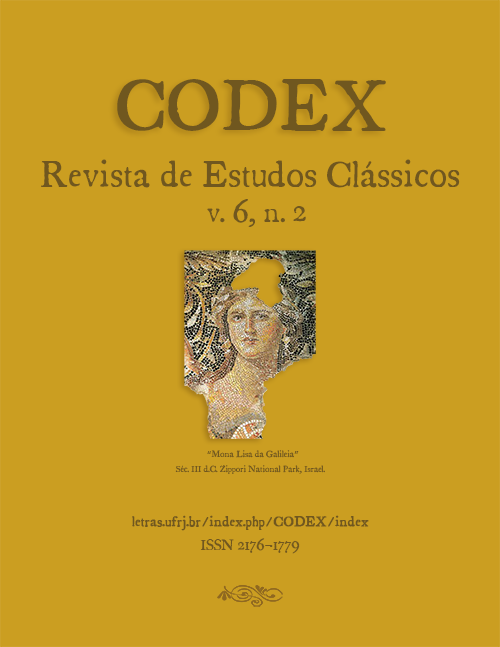Echoes from the Latin Praetexta in our days
DOI:
https://doi.org/10.25187/codex.v6i2.21531Keywords:
Latin theater, historical drama, fabula praetexta, modern praetextaeAbstract
During the third century B.C., when the literary drama was introduced in Rome, some poets composed the first fabulae praetextae, tragedies whose plots were based on Roman history, current events or Latin legends. Considering the production of praetextaegathered from the Roman Republic era through the Imperial period, Octavia, an anonymous drama which depicts the conviction of Nero's wife, is the only play of that genre to survive in its entirety. During the Renaissance, the Baroque and the Neoclassical period, a number of modern playwrights revisited Roman historical narratives and legends, reviving the fabula praetexta. In the 19th and 20th centuries, the Roman themes were also portrayed in novels and movies, while ancient praetextae received sequel versions. The analysis of numerous performances in São Paulo during the 21st century related to events in Ancient Roma reveals the presence of the classical culture on stage today, defying time and circumstances.References
ABALADA, Victor Emmanuel Teixeira Mendes. Metastasio por Francisco Luiz Ameno: ópera, poder e literatura nas reformas do Portugal setecentista. Monografia de Mestrado. Unirio, Rio de Janeiro, 2011.
Antony & Cleopatra de William Shakespeare. SESC, 1995 (Programa de espetáculo).
BAYET, Jean. Littérature latine. Paris: Colin, 1965.
BOYLE, Anthony James. An introduction to Roman tragedy. London and New York: Routledge, 2006.
BRESCIA, Rosana Marreco; LINO, Sulamita Fonseca. O teatro de tradição ibérica na América Portuguesa na primeira metade do século XVIII: arquitectura e repertório. European Review of Artistic Studies. vol. 4, no 1, p. 31-53, 2013.
BUDASZ, Rogério. Teatro e música na América Portuguesa. Convenções, repertório, raça, gênero e poder. Curitiba: DeArtes-UFPR, 2008.
CAMUS, Albert. Caligula suivi de Le malentendu. Paris: Gallimard, 1977.
CANO, Pere-Luis; LORENTE, Joan. Espectacle, amor i martiris al cinema de romans. Tarragona: Facutat de Filosofia i Lletres, 1985.
CARBONE, Martin. The Octavia: Structure, date and authenticity. Phoenix 31, p. 48-67, 1977.
CHEVALLIER, Raymond. Dictionnaire de la Littérature Latina. Paris: Larousse, 1968.
ERASMO, Mario. Roman tragedy, theatre to theatricality. Austin: University of Texas Press, 2004.
FERRI, Rolando. Octavia: a play attibuted to Seneca. Cambridge: Cambridge University Press, 2003.
GIANCOTTI, Francesco. L'Octavia attribuita a Seneca. Turim, Loescher-Chiantore, 1954.
GRIMAL, Pierre. Francesco Giancotti, L' Octavia attribuita a Seneca. Revue des Études Anciennes, no 57, p. 398-401, 1955.
HIGUET, Gilbert. The classical tradition. Greek and Roman influences on western literature. New York & London: Oxford University Press, 1949.
KOUDELA, Ingrid. Os fantasmas de Heiner Müller. Revista USP, no 35, p. 182-185, set/out/nov 1997.
LESKY, Albin. A tragédia grega. Tradução de J. Guinsburg, G. G. Souza e A. Guzik. São Paulo: Perspectiva, 1971.
MAGALDI, Sábato; VARGAS, Maria Thereza. Cem anos de teatro em São Paulo. São Paulo: Editora SENAC São Paulo, 2000.
MARTINDALE, Charles; MARTINDALE, Michelle. Shakespeare and the uses of antiquity. London & New York: Routledge, 1994.
MENEZES, M. E. Memórias de Adriano. In: O Estado de São Paulo, Caderno 2, p. C3, 12/2/2016.
PASQUALE, Daniela di. Metastasio al gusto portoghese: Traduzioni e adattamenti del melodramma metastasiano nel Portogalo del Settecento. Roma: Aracne, 2007.
PLUTARCH. Life of Antony. Cambridge: Cambridge University Press, 1994.
_____. Makers of Rome (Coriolanus, Fabius Maximus, Marcellus, Cato the Elder, Tiberius Gracchus, Gaius Gracchus, Sertorius, Brutus, Mark Antony). Traslated with an Introduction by Ian Scott-Kilvert. London: Penguin Books, 1965.
PLUTARQUE. Pompée, Crassus, César ou l’agonie de la République. Trad. de Robert Francelière. Paris: Autrément, 1994.
POE, Joe Park. Octavia praetexta and its Senecan model. American Journal of Philology, no 110, p. 434-459, 1989.
RIBNER, Irving; KITTREDGE, George Lyman. The complete works of Shakespeare. Edited by Irving Ribner & George Lyman Kittredge. Walthan, Massachussets/ Toronto: Ginn and Company, 1971.
ROYO, M. L’Octavie entre Néron et les premiers Antonins. Revue des Études Latines no. 61, p. 189-200, 1983.
SALLES, Catherine. Spartacus et la revolte des gladiateurs. Bruxelles: Éd. Complexe, 1990
SÉNÉQUE. Tragédies. Tome I. 3e tirage. Texte établi et traduit par Léon Herrmann. Paris: Les Belles Lettres, 1971.
SHAKESPEARE, William. Julius Caesar. Edited by A. W. Verity. Cambridge, Cambridge University Press, 1952.
SUÉTONE. Les douze Césars. Paris: Ambassade du Livre, 1963.
SUETÔNIO. A vida dos doze Césares. 2a. edição reform. Apresentação de Carlos Heitor Cony. Tradução de Sady-Garibaldi. Rio de Janeiro/ São Paulo: Prestígio Editorial, 2002.
TITE-LIVE. Histoire Romaine. Tradução de Eugene Lasserre. Paris: Garnier, 1944.
TRINGALI, Dante. A Arte Poética de Horácio. São Paulo: Musa, 1993.
VERITY, A. W. “Introduction”. In: SHAKESPEARE, William. Julius Caesar. Edited by A. W. Verity. Cambridge, Cambridge University Press, 1952. p. ix-xxxiv.
YOURCENAR, Marguerite. Memórias de Adriano. Trad. de M. Calderaro. 2. ed. São Paulo: Nova Fronteira, 1980.
ZORZETTI, Nevio. La pretesta latina e il teatro latino arcaico. Napoli: Liguori Editore, 1980.
Downloads
Published
How to Cite
Issue
Section
License
This work is licensed under a Creative Commons Attribution-NonCommercial 4.0 International License.










